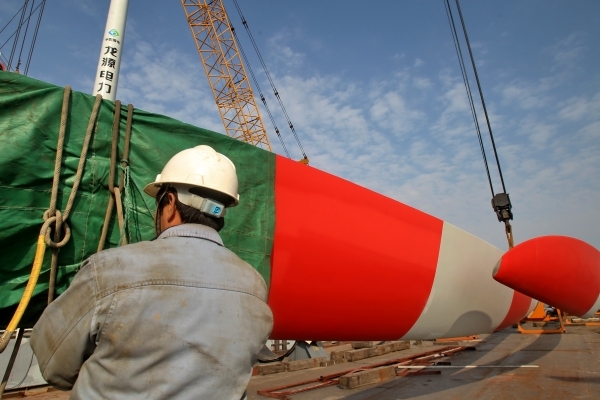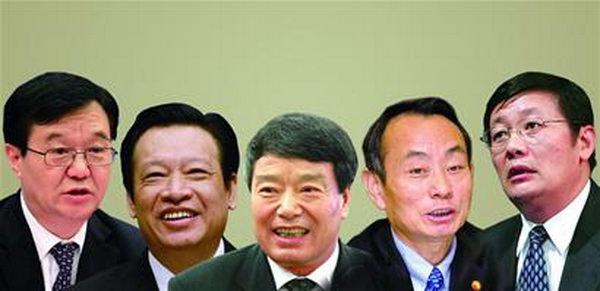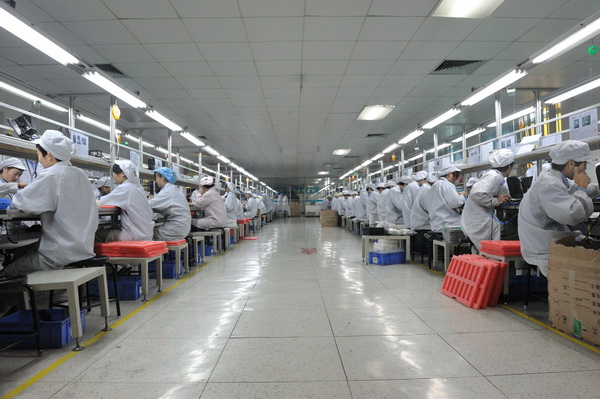

Highlights from the EO print edition, No. 612, Mar 25, 2013

Guo Shuqing's 17 Months at CSRC
News, page 2
~ In the recent reshuffle of senior government positions, Guo Shuqing (郭樹清) has been removed from his post as Chairman of China Securities Regulatory Commission (CRSC) and will take up a position in Shandong. Guo launched a series of new policies during his one and a half year's in office. Guo also brought a lot of changes to CRSC and was praised for communicating policy initiatives.
~ Guo's new policies were focused on building a market-oriented pricing mechanism in the primary market, encouraging innovation of products and services and breaking the power of monopoly players in the investment market.
~ Though facing a lot of opposition, Guo also launched reforms aimed at making the IPO approval process more transparent.
~ Lei Jie (雷杰),chairman of Founder Securities, told the EO that the securities industry is quite different now and talked about two new initiatives - asset securitization and debt financing instruments. Lei also said that the CRSC wants to create a number of large securities companies with billions of yuan worth of assets over the next three to five years.
~ In early 2013, CRSC published a book called The Next Decade - China's Economic Transformation and Breakthrough (未來(lái)十年——中國(guó)經(jīng)濟(jì)的轉(zhuǎn)型與突破). A speech that Guo gave to the Lu Jiazui Forum about the importance of financial structure reform served as the foreword to the book.
Original Article: [Chinese]

China's Wind Power Capacity Going to Waste
News, page 3
~ A notice from the National Energy Administration (NEA) said that the amount of unused wind power capacity reached 20 billion kilowatt hours in 2012, which doubled the unused capacity in 2011. This is largely the result of companies being unable to connect wind turbines to the national power grid.
~ According to an estimate by Qin Haiyan, secretary-general of the Wind Energy Committee in the Chinese Renewable Energy Society, this has resulted in direct economic losses of over 10 billion yuan.
~ This year, the NEA published a notice to State Grid and its five power generation groups aiming to push forward work in connecting these wind turbines to the grid.
~ Wind energy only accounts for 2 percent of China's power production. The huge amount of unused capacity indicates problems in energy management rather than an overcapacity of wind power.
~ In spite of there being much stronger wind in Northern China, northern provinces have averaged much less wind power production than the southern province of Yunnan. Yunnan is governed by China Southern Power Grid, while the north is covered by State Grid.
~ "Most of the grid-tied wind power plants here are invested in by [State Grid's] five power companies," said the director of a management committee for an economic and technological development zone in Gansu Province. "They can easily get permission from State Grid."
~ "To solve the grid-tied problem, the power system should be reformed," said Qin Haiyan. "We should break restrictions between administrative regions and expand the allocation range of wind power."
Original Article: [Chinese]

Special Feature: The Challenges Facing China's New Ministers
News, page 4-5
~ This week's news section takes a look at some of the new appointments to the heads of China's major ministries and commissions.
~ Xu Shaoshi (徐紹史) was recently appointed to the head of the National Development and Reform Commission (NDRC), China's peak economic planning agency. The 62-year-old has a masters degree in economics and was head of China's Ministry of Land and Resources before being moved to the NDRC. Analysts say that Xu will be challenged by the task of turning the NDRC from a "super ministry" into a team player that's willing to work with other departments and government bodies to achieve the goals and broad reform plan laid out during the 18th Party Congress.
~ Jiang Jiemin (蔣潔敏) has taken over from Wang Yong as the head of the State-owned Assets Supervision and Administration Commission (SASAC). The 58-year-old Jiang was previously the chairman of China National Petroleum Company (CNPC) and has years of experience working in the oil sector and thus has a reputation as someone who understanding business. Jiang was not appointed as the party secretary of SASAC, this position will be filled by Zhang Yi, an official with experience working for the Communist Party's anti-corruption body, the Central Discipline Inspection Commission (CDIC). This returns the SASAC to the "dual leadership" that existed when it was formed in 2003. Since 2005 however, the head of SASAC also served as its party secretary.
~ Gao Hucheng (高虎城) was appointed as China's new Minister of Commerce. Gao has served as deputy head of the Ministry of Commerce for almost 10 years and has a PhD in sociology. Gao has a reputation for being professional and decisive.
~ The 63-year-old Lou Jiwei (樓繼偉) has been selected to serve as the new Minister of Finance (MOF). After 6 years serving as the head of China Investment Corporation (CIC), China's sovereign wealth fund, Lou returns to the MOF where he spent 9 years frpm 1998 to 2007 as deputy head. Lou has been described by former colleagues and subordinates as being something of a "scholar-official."
~ Wu Xinxiong (吳新雄) will head up the National Energy Administration (NEA). Wu, who once served as the governor of Jiangxi province and more recently as the chairman of the now defunct State Electricity Regulatory Commission (SERC), wants to reform how China's power generation industry is organized and many believe this will be his first mission as the new head of the NEA.
Original Article: [Chinese]
Former Head of China Iron & Steel Association Tried for Corruption
News, page 6
~ On Mar 21, 2013, the trial of Shan Shanghua (單尚華), former secretary-general of the China Iron & Steel Association (CISA), began. He was being tried in the Beijing Second Intermediate People's Court by the public prosecutor on charges of "personally dividing state-owned assets."
~ The indictment against Shan said that from January 2005 to October 2008, while he served as the president of the China Metallurgical Industry Planning and Research Institute (CMIPRI), he colluded with Zhang Siyou (張思友), who was director of the planning division of CMIPRI at the time. They allegedly divided up over 4 million yuan in state assets. Both were arrested and brought to trial on Mar 28, 2011 and May 23, 2011 respectively.
~ In the spring of 2012, both Shan and Zhang were released on bail. The source and composition of the four million yuan in state-owned assets was the focus of this month's trial. Shan explained that over 600,000 yuan went to CMIPRI's staff for working overtime. 1.2 million yuan was used for rehiring employees who had retired and other fees during the period from 2005 to 2008.
~ Shan admitted in court that he had personally received 1.66 million yuan. "But this 1.66 million yuan was part of my legal income," he said. "I wasn't acquiring it fraudulently. It's a kind of distribution system reform."
~ The "distribution system reform" refers to a set of new incentives Shan introduced within CMIPRI while he served as president. 1.66 million yuan and 490,000 yuan that went to Shan and Zhang respectively came from bonuses issued between 2005 and 2008.
~ The public prosecutor said that all CMIPRI's income constitutes state-owned assets and that Shan and Zhang, as the people directly responsible, violated state regulations and distributed state-owned assets to themselves. The trial lasted one day. The verdict has yet to been announced
Original article: [Chinese]

Special Feature: Interviews with the Mayors of Dongguan, Erdos and Chengdu
Nation, page 11-12
~ This week's Nation section features interviews with the mayors of Dongguan, Erdos and Chengdu.
~ The mayor of the southern city of Dongguan, also known as the "workshop of the world," talks about how they want to attract larger more technologically advanced companies to the city and also how they hope that market forces will push this process of "industrial upgrading" forward.
~ The city of Erdos (鄂爾多斯) is in Inner Mongolia and is best known for its wealthy coal bosses and "ghost cities." The mayor of the city talks to the EO about how the apartments will eventually fill up and how the city can't simply rely on its mineral wealth to fuel growth.
has done to improve food safety monitoring.
Original article: [Chinese, Chinese and Chinese]
Health Insurance in China Troubled by Serious Illness Coverage
Market, page 20
~ On March 20, the China Insurance Regulatory Commission (CIRC) officially issued interim regulations on the serious illness insurance packages offered to urban and rural residents by the country's insurance companies. These regulations clarify which insurance companies are qualified to offer serious illness coverage and also require insurance companies operating in this area to follow the principle of "making little profit" (保本微利).
~ "It's hard to "make little profit" in the business of serious illness insurance," an employee of a health insurance company told the Economic Observer.
~ Currently, over 100 insurance companies are engaged in the domestic health insurance business. The data show that 80 percent of them have a loss ratio of 80 percent, and 40 percent of them have ratios as high as 100 percent. A couple of companies even have loss ratios of 200 percent. Once you add administrative expenses and other operating costs to this figure means that they're operating at a loss.
~ "The demand for health insurance is huge, but life insurance companies are unwilling to do business in an environment in which they experience net losses," an experienced health professional told the EO.
Original article: [Chinese]
The Rebirth of 3rd Party Online Train Ticket Sales
Corporation, page 30
~ Under the Ministry of Railways, third parties were barred from distributing train tickets. But with the ministry's dismantling and the establishment of China Railway Corporation, many online businesses have been emboldened to restart services purchasing train tickets for their customers. Policy hasn't officially changed though, which means that these businesses have still had to find loopholes through which to operate.
~ On Mar 9, Ctrip.com International Ltd., a Chinese travel agency, began selling bullet train and high-speed railway tickets bundled with travel insurance. On Mar 18, the service was upgraded to provide booking for all trains.
~ Ctrip has been working on this program since July, 2011 - one month after the trial of the official Ministry of Railways 12306.com online booking website began. At that time Ctrip acquired a ticket booking website, which was later named tieyou.com.
~ However, last April, train ticket purchasing services were effectively stopped after new restrictions were introduced by the Ministry of Railways that prevented commercial websites from purchasing tickets for their clients. But Ctrip continued its research, and when it became apparent the Ministry of Railways would be dismantled, it rebooted the service.
~ The service now has two major changes. First, the bundling of train tickets and insurance has changed the profit-seeking model. In the past, Ctrip made its money on a fee for mailing the tickets. Now, it actually sells customers travel insurance at a marked up price and then includes the train tickets as a free "gift." This not only allows Ctrip to sidestep restrictions on selling train tickets, but also allows greater profits.
~ Another change is in the process of ticket booking. Previously, customers paid for their orders online and provided their ID numbers. Websites would then send customers' ID numbers to ticket agents they worked with, who would then buy the tickets and send them to customers. Now, the customers pay for their orders on ctrip.com or tieyou.com and then staff there will simply log in to 12306.com and book tickets for their customers. A senior manager at tieyou.com (鐵友網(wǎng)), who asked not to be identified, told the EO that the booking process actually isn't done by people, but done automatically by software linked to 12306.com.
Original article: [Chinese]
Fake Gold Scandal Rocks Chow Tai Seng
Corporation, page 32
~ On Mar 15 as part of an annual consumer rights campaign, CCTV ran an exposé on fake gold in Luohu District of Shenzhen involving the well-known jewelry retailer Chow Tai Seng (周大生).
~ Luohu District has become the largest distribution center of gold jewelry in China. The scandal has hit the industry hard. The Luohu Branch of the Market Supervision Administration of Shenzhen Municipality said that it would make a blanket examination of gold enterprises in Luohu.
~ In 2004, a senior manager of a gold manufacturing enterprise sent gold products to Hong Kong for testing, which showed they’d been adulterated with iridium. However, he didn’t reveal the problem, fearing the news could damage the whole industry chain. Nine years later, the iridium has become even finer and harder to detect. Huge profits can be made from lacing gold products with it since one gram of iridium worth 50 to 90 yuan while one gram of gold worth 300 to 400 yuan.
~ Chow Tai Seng admitted that it was lax in supervision of its supply chain and had entrusted some of their products to unreliable factories in Putian, Fujian Province. Also, the spectrograph equipment used in enterprises like Chow Tai Seng can only probe 0.03 millimeters into gold. So if one wants detect iridium powder, one has to cut the jewelry. If no adulteration is found, Chow Tai Seng has to absorb the costs of destroying the jewelry. Some processing plants took advantage of the reluctance to use destructive detection.
~ What was puzzling was that the gold jewelry labeled pure after testing by the state quality supervision department turned out to be substandard after CCTV sent it to another quality supervision agency.
~ Zhou Tingda (周庭達(dá)), administrative director of Shenzhen Yuehao Jewelry Co. Ltd. (深圳粵豪珠寶有限公司) ,said that after buying jewelry, customers sometimes leave the qualification label behind. It can then be reused on other untested products.
~ Chow Tai Seng has been preparing for its initial public offering (IPO). However, if the company’s market share drops dramatically in light of this incident, it may not be able to go ahead with its plans.
Original Article: [Chinese]